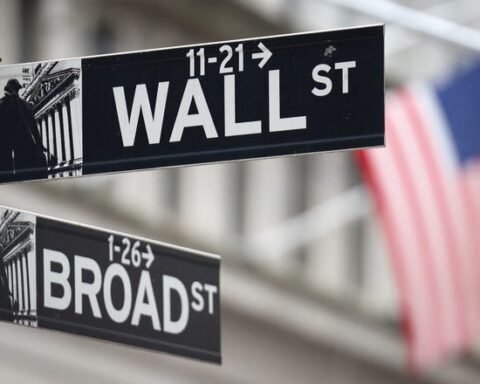
Dow Surges by 1,400 Points as Trump Reclaims Presidency, Sparking Major Market Rally
Markets Surge as Trump’s Pro-Business Policies and Election Certainty Fuel Investor Optimism
·

Stocks Soar as Market Responds to Trump’s Pro-Business Stance and Renewed Political Certainty
In the wake of former President Donald Trump’s victory in the 2024 U.S. presidential election, U.S. markets surged dramatically on Wednesday, with the Dow Jones Industrial Average climbing 1,439 points, or 3.4%, by early afternoon. This impressive rally marks the first time since November 2022 that the Dow has posted a single-day gain over 1,000 points. The S&P 500 rose by 2.3%, setting a record intraday high, while the tech-heavy Nasdaq climbed 2.7%. Trump’s decisive win, along with the Republicans gaining control of the Senate, has bolstered investor confidence, signaling potential for a more business-friendly political landscape.
Market Embraces Certainty and Pro-Business Policies
The market’s rally reflects a sense of relief among investors, who feared prolonged uncertainty if the election results were contested. Michael Block, Chief Operating Officer at AgentSmyth, noted, “There’s clarity: We’re not going to see another January 6th event. The market is breathing a huge sigh of relief on that.” Trump’s victory in key battleground states and the Republican Senate win have fueled hopes for deregulatory policies and lower taxes, which investors see as a boon for economic growth.
Trump’s re-election suggests a policy focus on reducing regulations, boosting public spending, and maintaining a business-friendly environment. While these factors buoyed stocks, JPMorgan analysts cautioned that policy uncertainty may increase in 2025 as Trump’s agenda unfolds. Historically, stocks and GDP have shown stronger performance under Democratic administrations, with an average S&P 500 return of 10% versus 6.7% under Republicans, according to CFRA Research.
Wall Street’s Initial Reaction: Optimism and Risks
Investors are largely optimistic about Trump’s business-centric policies, which could benefit sectors from banking to energy. Art Hogan, Chief Market Strategist at B Riley Wealth Management, noted, “The market is saying: We just elected a business-friendly president. The initial reaction to a Trump administration is met with enthusiasm that may be temporary.” However, with Trump’s proposed tariffs, higher Treasury yields could present a challenge to the Federal Reserve’s rate-cutting goals. Bond yields, which trade inversely to prices, rose to 4.47% on Wednesday, potentially pressuring consumer loans and mortgage rates.
Trump’s approach may impact inflation and borrowing costs, particularly if tariffs drive up prices. Andrzej Skiba, head of BlueBay U.S. Fixed Income at RBC Global Asset Management, observed, “With higher tariffs, the Fed will not be in a position to cut rates even if the economy is slowing down — and that is a toxic mix for fixed income.”
Trump’s Impact on Specific Sectors
In addition to the stock market’s broad gains, certain industries rallied in response to Trump’s pro-business stance and deregulatory agenda. Bank stocks surged, with Citi rising 8.5%, Bank of America up 7.7%, and JPMorgan Chase gaining 7%. Stocks in the detention and deportation sectors also soared, with GEO Group and CoreCivic up by 34% and 25%, respectively. Trump’s return to office sparked a wave of confidence in industries positioned to benefit from his policies.
Tesla saw a near 14% increase, with analysts predicting that Trump’s close relationship with Elon Musk could foster favorable policies. Nikos Tzabouras of Tradu commented that Musk could have an “open door” to the White House.
Global Markets Respond Cautiously
International markets showed mixed reactions. European stocks underperformed relative to U.S. peers, with the Stoxx Europe 600 up just 0.1%. Germany’s DAX dipped by 0.3%, France’s CAC rose 0.1%, and the UK’s FTSE 100 gained 0.5%. Asian markets also had varied responses: Japan’s Nikkei 225 closed 2.6% higher, while Hong Kong’s Hang Seng index dropped 2.2%, with investors concerned about potential tariffs on Chinese goods.
In China, equities remained steady, though investor caution stemmed from expected U.S.-China trade tensions under Trump. Daniel Murray, head of research at EFG Asset Management, explained, “Chinese equities sold off overnight in expectation of more tariffs on US imports from China.”
Cryptocurrency and U.S. Dollar on the Rise
Trump’s evolving stance on cryptocurrencies seemed to resonate with investors, as Bitcoin broke $75,000 for the first time. The U.S. dollar also strengthened against the euro and British pound, rising 1.7% to its highest point since July. Analysts attribute the dollar’s rise to Trump’s proposed tariff policies, which may boost demand for U.S. goods domestically.
Conclusion
As Trump prepares for his second term, Wall Street is optimistic about the potential for a deregulated, business-friendly economy. Although uncertainties remain, particularly regarding inflation and interest rates, investors have embraced the market’s newfound clarity and the promise of economic growth under Trump’s leadership. This post-election rally highlights a renewed confidence among investors, setting the stage for potentially transformative years ahead in the U.S. economy.
Post Views: 142
- Trump’s New Tariff Order on Canadian Imports Sends Shockwaves Through the Stock Market
- Timothée Chalamet and Kylie Jenner Spotted Sharing a Kiss at the BNP Paribas Open, Fueling Romance Rumors
- Trump Shows Support for Musk Amid Struggles: “I’ll Buy a Tesla to Back Elon”
- Millie Bobby Brown Speaks Out Against ‘Horrible’ Media Coverage: “I Will Not Be Shamed”
BUSINESS
CEO INSIDER
This error message is only visible to WordPress admins
Error: No feed with the ID 1 found.
Please go to the Instagram Feed settings page to create a feed.















